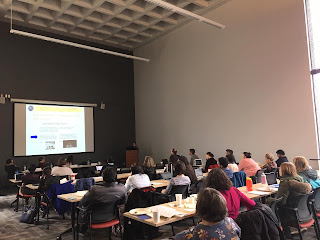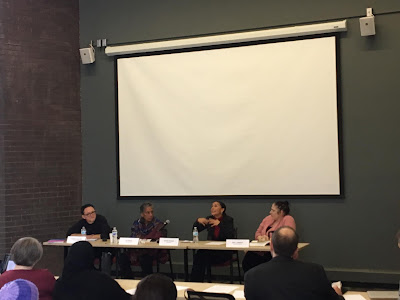 |
| Photo by Allison Wheeler |
by Sydney Lazarus
Last month, dozens of leading scholars from the University of Illinois, Urbana-Champaign and other universities across the U.S. convened to discuss migration, citizenship, and political socialization as part of a symposium titled “Refugees, Migrants, Citizens: Political Socialization across Borders.” The December 6, 2019 symposium was organized by Christoph Schwarz, Visiting Research Fellow with the Center for South Asian and Middle Eastern Studies. “There is a certain research gap between migration research and political socialization research, in a broader sense,” said Schwarz, who intended for the symposium to be a means for fostering interdisciplinary debate.
The morning began with a panel of scholars who offered fresh perspectives on conceptualizing political socialization in a world of mobilities and hybrid identities. Tawnya Adkins Covert, Professor of Sociology at Western Illinois University, gave a brief history of political socialization research before advocating for a life course model that would consider both our personal experiences as well as institutions (e.g., family, church) in molding our political views. Not only do our political views continue to evolve well beyond adolescence, Adkins Covert noted, but the nature of our political concerns also evolves as we take on new roles in society. Speaking very generally, for instance, parents might take more of an interest in education, whereas older adults might be more concerned with healthcare policy.
Diana Owen, Professor of Political Science at Georgetown University, zeroed in on the political socialization of migrant communities vis-à-vis mass media. Owen explained that media becomes a more significant source of political socialization for migrants, whose personal ties in their destination countries may be more limited. Social media in particular becomes a way for migrants to maintain a connection to their cultural and community identity and facilitate mobilization.
The next panelist, Liz Dávila, Assistant Professor of Education Policy, Organization, and Leadership at the University of Illinois, Urbana-Champaign, discussed the question of how newly arrived immigrant and refugee high school students conceive of civic engagement. Twenty years ago, Congolese migrants began to arrive in Champaign-Urbana, and today there is an established Congolese migrant community. In presenting findings from interviews that she has conducted with local Congolese students, Dávila emphasized three themes. The students voiced pride in their cultural heritages, showed awareness of how notions of legal and illegal citizenship is tied to race, and expressed complex understandings of civic engagement in relation to personal advancement and rights.
Kicking off the second panel, Veronica Terriquez, Associate Professor of Sociology at University of California, Santa Cruz, shifted the focus to the political socialization of Latinx youth in California’s politically conservative Central Valley. Terriquez found that while hostile regional contexts constrain Latinx youth’s political participation, youth organizing groups can act as a counterweight by providing civics education and training in grassroots organizing. Peer-to-peer phone banking in particular increased political participation.
The next presentation by Teresa Barnes, Associate Professor of History and Director of the Center for African Studies at the University of Illinois, Urbana-Champaign, explored the story of Jerry Essan Masslo, an African migrant who was working as a tomato picker in southern Italy when he was killed by thieves in 1989, at the age of 30. Barnes’ presentation showed how the public telling and retellings of Masslo’s death were shaped by and contributed to the dynamics of the international anti-apartheid solidarity movement. An opponent of apartheid in his native South Africa, Masslo arrived in Italy as a political refugee. He came to represent a progressive moment in Italian migrant history, Barnes said, as hundreds of thousands of people marched in the streets to bring attention to the treatment of migrant workers in Italy.
However, as Barnes went on to explain, Masslo may not have actually been South African. Neither Essan nor Masslo are South African names, and one of Barnes’ colleagues had once been told by someone who knew Masslo that he was not South African, yet Masslo had always identified himself as a migrant from South Africa. But more importantly, Barnes asked, why is Masslo’s nationality important? How valuable is Jerry’s story if he wasn’t South African?
The panel then turned its focus back to the U.S. as Jonathan Inda, Professor of Latina/Latino Studies at the University of Illinois, Urbana-Champaign, discussed the case of undocumented immigrants in Chicago who were denied organ transplants and the hunger strikes that they organized in protest of hospitals’ refusal to treat undocumented immigrants. While there is no law barring undocumented people from receiving organ transplants, Inda explained, undocumented status and lack of health insurance tend to go hand in hand, and undocumented people’s right to healthcare is the underlying issue.
 |
| From left to right: Jonathan Inda, Teresa Barnes, Veronica Terriquez, Dara Goldman. Photo by Allison Wheeler |
After a break for lunch, the symposium reconvened for a panel on human rights and border regimes. Jessica Greenberg, Associate Professor of Anthropology at the University of Illinois, Urbana-Champaign, discussed the case of Somali and Eritrean refugees traveling from Libya across the Mediterranean, the relationship between the European Court of Human Rights and European nation-states, and questions of national sovereignty and human rights. Greenberg focused on Hirsi Jamaa, who won a case in the European Court of Human Rights after Italian authorities intercepted migrants traveling by boat and returned them to Libya. Lauren Aronson, Director of the new Immigration Law Clinic at the Illinois College of Law, told the stories of Brian and Ali, pseudonyms of two individuals who were eventually granted asylum in the U.S. Brian was fleeing abuse, sexual assault, and gang violence when he arrived in the U.S. at the age of 14. His asylum was granted in 2018, shortly before former U.S. Attorney General Jeff Sessions announced that domestic and gang violence would not be grounds for asylum.
Closing out the third panel, Christoph Schwarz, the symposium organizer and a sociologist by training, discussed the transnational nature of the 2016-17 Hirak protest movement that demanded more cultural, political, and economic recognition of the marginalized and predominantly Berber region of Rif on the part of the Moroccan government. As the Rif region has one of the country’s highest rates of migration to the EU, the Hirak movement was able to mobilize the Moroccan — and especially the Rifi — diaspora in Europe. Protesters gathered not only in front of Moroccan embassies and consulates in Europe, but also in front of the European Parliament in Brussels and Strasbourg.
The fourth and final panel was a reflection on space, time, and memory. Rakesh Bhatt, Professor of Linguistics at the University of Illinois, Urbana-Champaign, analyzed the question of how displaced minority communities deal with the experience of migration through the case of the forced migration of Kashmiri Hindus from the Kashmir Valley. Bhatt noted that the Kashmiri migration to other regions of India was marked by a sense of disorientation and impermanence: adults found themselves alienated from their homeland, whereas their children were alienated from Kashmiri customs and language. Questions of identity and belonging were also at the heart of the next presentation by Dara Goldman, Associate Professor of Spanish at the University of Illinois, Urbana-Champaign, who discussed the place of Cuban Jews in configurations of Cuban citizenship.
The final panelist, Cynthia Buckley, Professor of Sociology at the University of Illinois, Urbana-Champaign, presented the case of ethnic Russians in Estonia as an example of borders moving across populations rather than people moving across borders. Much of Estonia’s ethnic Russian population is descended from Russians who moved to the former Soviet republic in the second half of the twentieth century. Today, the Estonian government’s efforts to assimilate ethnic Russians have been both controversial and of limited success. Buckley showed a few photos of street signs that are in both Estonian and English — the latter in order to be welcoming to other EU citizens — but not in Russian.
The image of migrants that emerged from these presentations was highly varied and geographically diverse — which was one of symposium organizer Schwarz’s aims. “The images that circulate often focus on the most dramatic stories, and migrants tend to be presented either as a threat or as helpless victims,” Schwarz said. “The first tendency is surely more problematic than the second, but in both, the political subjectivity of the migrants is overlooked. That means they are not perceived as individuals with political aims, ambitions, orientations, or participation in political life.”
This symposium was sponsored by the Center for South Asian and Middle Eastern Studies; European Union Center; Centers for East Asian & Pacific Studies and Global Studies; Departments of Political Science, Sociology, and Spanish and Portuguese; Illinois Program for Research in the Humanities; and Women & Gender in Global Perspectives. A Q&A with Christoph Schwarz will be published in the next few days.
“Refugees, Migrants, Citizens: Political Socialization across Borders”: Addressing Gaps in the Academic Scholarship on Migration





